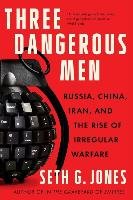In Three Dangerous Men, defence expert Seth Jones argues that the US is woefully unprepared for the future of global competition. While America has focused on building fighter jets, missiles and conventional warfighting capabilities, its three principal rivals-Russia, China and Iran-have increasingly adopted irregular warfare: cyber-attacks, the use of proxy forces, propaganda, espionage and disinformation to undermine American power.
Jones profiles three pioneers of irregular warfare in Moscow, Beijing and Tehran who adapted American techniques and made huge gains without waging traditional warfare: Russian Chief of Staff Valery Gerasimov; the deceased Iranian Major General Qassem Soleimani; and vice chairman of China's Central Military Commission Zhang Youxia. Each has spent his career studying American power and devised techniques to avoid a conventional or nuclear war with the US. Gerasimov helped oversee a resurgence of Russian irregular warfare, which included attempts to undermine the 2016 and 2020 US presidential elections and the SolarWinds cyber-attack. Soleimani was so effective in expanding Iranian power in the Middle East that Washington targeted him for assassination. Zhang Youxia presents the most alarming challenge because China has more power and potential at its disposal.
Drawing on interviews with dozens of US military, diplomatic and intelligence officials, as well as hundreds of documents translated from Russian, Farsi and Mandarin, Jones shows how America's rivals have bloodied its reputation and seized territory worldwide. Instead of standing up to autocratic regimes, Jones demonstrates that the United States has largely abandoned the kind of information, special operations, intelligence and economic and diplomatic action that helped win the Cold War.
In a powerful conclusion, Jones details the key steps the United States must take to alter how it thinks about-and engages in-competition before it is too late.

